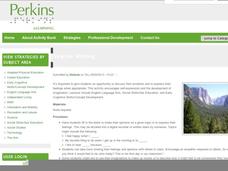Perkins School for the Blind
Encouraging Students Who are Blind or Visually Impaired to Express Their Feelings and Explore Imagination
Being expressive in a creative, empathetic, or imaginative way is not only fun, it builds good pre-writing and communication skills. Learners with visual impairments have a roundtable discussion session where several sentence frames...
Perkins School for the Blind
Grocery Shopping
Grab those reusable bags, it's time to go shopping! Intended to foster independent living skills in learners with visual impairments, the lesson covers several topics related to grocery shopping. They start by planning a meal, reading...
Perkins School for the Blind
Taking Turns
For small children or learners with disabilities, learning to wait patiently and taking turns is very important. In pairs, two children with visual impairments take turns asking for, waiting for, and playing with a musical...
Perkins School for the Blind
What Would You Do If...?
What would you do if...? That's a great question, and, when posed to learners with visual impairments, a question that can foster concept development and speaking and problem-solving skills that relate to real-life situations. The...
Perkins School for the Blind
Familiar Sounds
To foster concept development and auditory discrimination skills, learners with visual impairments listen to identify a variety of common sounds. The teacher makes recordings of various sounds, including those found in the home, at the...
Perkins School for the Blind
Learning to Identify Sounds Made by the Body
Sneeze, snap, tap, and whistle; Did I do that? Explore the parts and sounds of the human body with your learners with visual impairments. First you'll name the parts of the body, make a sound with each part, and then have the class...
Perkins School for the Blind
Left Versus Right
When you can't see, it is extremely important to be able to reorient yourself. Learners with visual impairments work though an activity to build spacial awareness based on moving left and right. A marker (bracelet, bell, or weight) is...
Perkins School for the Blind
Put the Shoe on Your Foot
Promote clothing identification, body part identification, and dressing skills acquisition with a fun and lively game. Each child takes turns grabbing a clothing item from the central clothing box. As he puts the item on, he sings,...
Perkins School for the Blind
Treasure Hunt
On, over, and under are some very common prepositions; but how can you teach these concepts to children with visual impairments? Here, is one way. Kids will practice following verbal commands as they go on a classroom treasure hunt. They...
Curated OER
Vocabulary/Reading Lesson for Students with Severe Intellectual Disabilities
Here is a great little reading and vocabulary development lesson plan created just for learners with special needs. The lesson plan is constructed with both core content and necessary adaptations in mind. The group will use PECS,...
Nazareth College
Chronological Order
First, next, and last, the elements of chronological order. In every story or text one can find a series of events that occur one after the other. To help learners with visual impairments conceptualize chronological order, this...
Perkins School for the Blind
Let's Pretend
Playing pretend with real objects or concepts is a wonderful way for learners to make object-to-action connections, as well as practice daily living skills. Learners with visual and intellectual disabilities use a wide variety of real...
Perkins School for the Blind
Hat Game
Sometimes the simplest ideas foster a lot of different skills. To boost social skills, group participation, identifying others by name, and dressing skills, learners play the hat game. They take turns wearing a hat while...
Perkins School for the Blind
Following Directions
Turn the act of following directions into a fun and engaging game! Especially designed for students with cognitive or intellectual disabilities, this lesson uses a game format as a natural reinforcer. Write a set of directions onto a set...
Curated OER
How Do I know That a Book Is Just Right for Me to Read?
Students choose a book for reading. In this language arts instructional activity, students take steps to evaluate a book for free reading. Students make a list of words found in the book that they are unfamiliar with.
Perkins School for the Blind
Find the Objects/Beginning Sound Indentification
If you are just starting out as a teacher for children with visual impairments and want a fun way to teach braille and phonemic awareness, look no further. You'll fill 21 boxes with objects that start with specific letter sounds. You'll...
Perkins School for the Blind
Memory
When you are blind, your hands become your eyes, so learning how to discriminate between various objects through touch is a very important skill. Make a memory game by gluing common items onto cardstock. The kids feel, identify, and...
Perkins School for the Blind
Personal Information
"Hi, how are you? My name is___." Seems simple enough but it's not always that easy to recall and relate factual information about yourself. Learners with multiple disabilities practice memorizing and relaying personal information about...
Perkins School for the Blind
Where Shall I Put It?
Position and positional phrases are concepts that need to be constructed for learners with low or no vision. Help them gain competence and a conceptual understanding of words like on, in, and under with a funny game. After gathering a...
Perkins School for the Blind
Learning Names of Articles of Clothing
What to wear today; such a vexing question. Spend some time introducing the names, fabrics, types, colors, and functions of various articles of clothing to your class. Each child will take turns asking each other what they are wearing....
Perkins School for the Blind
Initial Consonant Activity
Bingo is a super fun game and can be used to reinforce a vast number of recognition skills. These bingo cards are prepared by constructing nine squares, each delineated with raised Wikki Stix or gluedyarn and containing a...
Perkins School for the Blind
Conversation Skills
It is so important for learners with multiple disabilities to learn how to communicate for both social and functional reasons. Each child will choose a topic from the list and generate five questions related to that topic. They'll split...
Perkins School for the Blind
Circle Time
Oftentimes children or teens with one or more disability are reluctant to participate in whole-group activities. Foster good participation, verbal expression, and social skills through daily circle time activities. Each day you and...
Perkins School for the Blind
Build a Word
Get out those scrabble tiles and a braille tape labeler because today we are playing a build-a-word game! Label several sets of scrabble tiles using the braille labeler, place them in a box, and have children take turns pulling letter...























